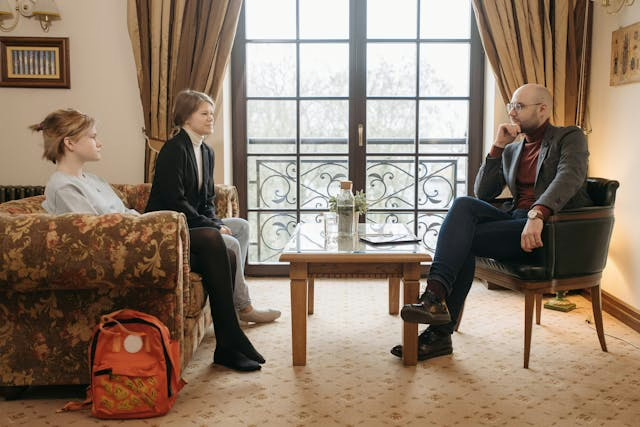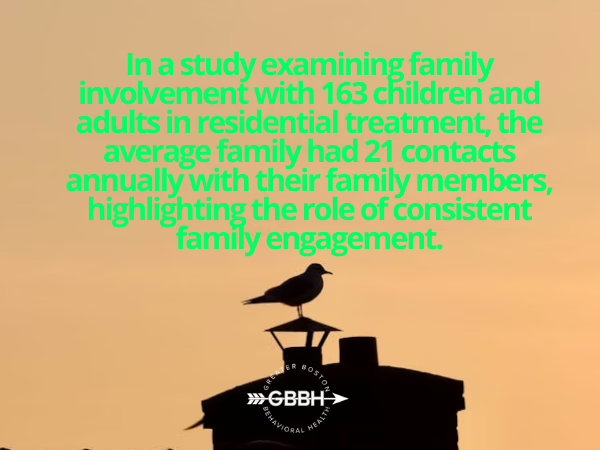When an individual is struggling with a mental health disorder, trauma, or substance use disorder, their family plays a critical role in their recovery. While residential treatment provides structured, 24/7 care, long-term healing is most successful when families actively participate in the process. A strong support system fosters understanding, communication, and encouragement, significantly improving treatment outcomes.
At Greater Boston Behavioral Health, we believe that family involvement is essential to lasting recovery. Our residential treatment programs focus not only on the individual’s healing journey but also on equipping families with the tools to support their loved one in a meaningful way.
This guide explores why family participation is essential, the benefits it provides, and how families can actively engage in their loved one’s residential treatment and recovery journey.
Why Family Involvement is Crucial in Residential Treatment
Mental health and addiction challenges do not only affect the individual—they impact the entire family unit. Families often experience emotional distress, miscommunication, and a sense of helplessness as they watch their loved one struggle.
Studies show that family involvement in treatment leads to better outcomes, including:
- Lower relapse rates for mental health and substance use disorders.
- Stronger emotional support systems that reinforce recovery.
- Healthier family relationships that reduce stress and improve communication.
- Better understanding of mental health conditions, leading to increased empathy and patience.
- Improved adherence to aftercare plans, increasing long-term success.
By integrating family therapy, education, and support programs, Behavioral Health in Boston provides families with the knowledge and skills necessary to create a supportive home environment.
The Benefits of Family Involvement in Residential Treatment
1. Strengthening Family Bonds and Rebuilding Trust
Mental health struggles can create distance between family members, leading to resentment, misunderstandings, and emotional disconnection. This can make recovery more difficult if relationships remain strained. Residential treatment programs that encourage family involvement help rebuild trust and strengthen emotional bonds by facilitating open and constructive dialogue.
How Family Involvement Helps:
- Encourages honest and supportive communication between family members.
- Provides opportunities for repairing strained relationships in a structured environment.
- Allows family members to better understand their loved one’s experiences and develop compassion and patience.
Example: A parent struggling to understand their child’s depression may learn how to provide emotional support without unintentionally applying pressure, strengthening their relationship.
2. Improving Communication and Conflict Resolution
Many families experience communication breakdowns when dealing with a loved one’s mental health struggles. Unspoken frustrations, misunderstandings, and ineffective communication patterns can lead to resentment and conflict.
How Family Therapy Improves Communication:
- Teaches active listening skills to foster understanding and prevent misinterpretation.
- Encourages family members to express emotions and needs in a constructive way.
- Provides problem-solving techniques to manage conflict in a healthy manner.
At Greater Boston Behavioral Health, our Family Therapy Programs use CBT Therapy and DBT Therapy to teach communication techniques and emotional regulation skills, helping families develop stronger, healthier connections.
3. Educating Families on Mental Health Conditions
One of the biggest challenges families face is a lack of knowledge about mental health disorders. Without proper education, it can be difficult to provide effective support.
How Family Education Helps:
- Helps family members understand the symptoms and behaviors associated with disorders like depression, anxiety, PTSD, and bipolar disorder.
- Reduces stigma and misconceptions about mental illness and addiction.
- Provides guidance on how to encourage treatment adherence and prevent relapse.
Example: A sibling struggling to understand their brother’s PTSD might learn how triggers and flashbacks work, allowing them to provide more patient and informed support instead of feeling frustrated.
4. Creating a Supportive Home Environment
Individuals transitioning out of residential treatment need a stable and healthy home environment to maintain recovery. Family involvement ensures that:
- Triggers at home are minimized (e.g., reducing conflict, stress, or exposure to unhealthy habits).
- Family members provide emotional support without enabling destructive behaviors.
- Families establish consistent routines and boundaries that promote long-term stability.
At Greater Boston Behavioral Health, we work with families to develop customized aftercare plans, ensuring that individuals return to a safe and supportive environment.
5. Reducing the Risk of Relapse
Individuals with strong family support are less likely to relapse after completing residential treatment. Family engagement provides accountability and encouragement, reinforcing recovery efforts.
Ways Families Help Prevent Relapse:
- Identifying early warning signs of a mental health decline or relapse.
- Encouraging continued participation in therapy, support groups, or outpatient programs.
- Providing motivation to stay committed to personal goals and self-care.
Family support is essential for maintaining progress made during inpatient care and ensuring individuals do not feel alone or unsupported after treatment.
How Families Can Get Involved in Residential Treatment
1. Participate in Family Therapy Sessions
Family therapy sessions provide a structured space where families can:
- Address past conflicts and rebuild trust.
- Learn communication skills to support recovery.
- Understand the role of family dynamics in mental health.
Therapists use CBT and DBT techniques to teach families how to navigate emotions and conflict constructively.
2. Attend Educational Workshops and Support Groups
Many treatment centers offer educational workshops to help families:
- Learn about mental health conditions and treatment approaches.
- Understand addiction recovery and relapse prevention.
- Develop healthy coping strategies to manage their own stress and emotions.
Support groups provide a community of families going through similar experiences, fostering connection and shared learning.
3. Establish Healthy Boundaries and Expectations
Families must balance support with independence. Establishing healthy boundaries helps prevent co-dependency and unrealistic expectations.
Examples of Healthy Boundaries:
- Encouraging personal responsibility while still providing emotional support.
- Setting clear expectations regarding household rules and responsibilities.
- Avoiding enabling behaviors that might contribute to relapse.
At Greater Boston Behavioral Health, we teach families how to set supportive yet firm boundaries that promote independence and accountability.
4. Maintain Engagement After Treatment
Recovery does not end when residential treatment is completed. Families play a key role in ensuring long-term success by:
- Encouraging ongoing therapy and outpatient programs like an Intensive Outpatient Program (IOP) or Partial Hospitalization Program (PHP).
- Attending regular check-ins or family counseling sessions.
- Reinforcing self-care habits and stress management techniques at home.
Continued family involvement helps individuals feel supported, motivated, and empowered in their recovery journey.
Greater Boston Behavioral Health: Supporting Families Through Recovery
At Greater Boston Behavioral Health, we believe that family plays a vital role in mental health and addiction recovery. Our Residential Treatment Programs include family therapy, education, and support services to help families rebuild connections and create a strong support system.
Take the First Step Toward Healing
If you or a loved one needs residential treatment with family involvement, we are here to help.
Call Greater Boston Behavioral Health at (888)278-0716 to learn more about our Mental Health Therapy Programs and Family Support Services. Together, we can build a stronger foundation for lasting recovery.
FAQ on Family Involvement in Residential Treatment
Why is family involvement important in residential treatment?
Family involvement is crucial because strong support systems improve recovery outcomes. When families participate in therapy and education, they help their loved ones build stronger coping skills, reduce relapse risks, and improve communication.
How does family therapy work in residential treatment?
Family therapy sessions provide a structured, safe space for families to:
- Address past conflicts and rebuild trust.
- Improve communication and emotional support skills.
- Learn about mental health disorders and how to provide proper support.
What if my family has a history of conflict?
Family therapy does not force relationships, but rather helps establish healthier boundaries and communication strategies. The goal is to create a supportive and safe environment for recovery.
What are some ways families can support their loved one after treatment?
- Encourage continued therapy and outpatient programs like IOP or PHP.
- Maintain open communication without judgment.
- Set healthy boundaries that promote independence.
- Participate in family support groups and educational workshops.
How can I start family therapy in a residential program?
Call Greater Boston Behavioral Health at (888)278-0716 to learn about our family therapy programs and residential treatment services in Boston.


